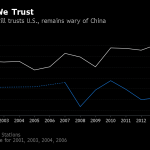Anxiety in Manila as Duterte blasts U.S., embraces China

During long hours stuck in Manila’s choking traffic, taxi driver Maning Yabut constantly hears about the anxieties of Filipinos from all walks of life. These days, the talk is all about whether President Rodrigo Duterte’s anti-U.S. outbursts are good for the Philippines. Particularly concerned, he said, are those with close links to America, such as the call-center workers at the heart of the $20-billion business-process outsourcing industry. Maning’s own sister moved to the U.S. and is now part of the 3.5 million-strong Filipino-American community there. “I’m baffled by what’s happening now in our country,” said the 60-year-old cabbie who voted for Duterte but is now experiencing a pang of buyer’s remorse. “We’ve been through a lot with the Americans, and it’s not good to break up with them.” While polls show Duterte remains wildly popular in the Philippines, concerns are growing about the potential costs of breaking up with the Philippines’ second-biggest trading partner and most important military ally. Duterte has pivoted to publicly embrace Beijing, a move that has puzzled many in a population that trusts the U.S. far more than China.

